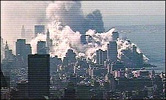
SATURDAY, March 13 (HealthDay News) — Police who responded on 9/11 to the collapsing World Trade Center towers appear to be at greater risk for heart problems compared with people in the general population, a new study finds.
The report was to be presented Saturday at the American College of Cardiology’s annual meeting, in Atlanta.
“This is the first study to suggest a potential link between exposure to Ground Zero and early preclinical heart abnormalities,” lead researcher Dr. Lori Croft, an assistant professor of medicine at Mount Sinai School of Medicine in New York City, said in an ACC news release.
“Inhaled particulate matter has been shown to cause lung and heart disease. Exposure to the dust from the collapsed buildings may play a role in these cardiac abnormalities,” she said.
For the study, Croft’s team looked at the heart function of almost 1,200 police officers who were observed at Mount Sinai Medical Center as part of a program to assess cardiovascular health after the Sept. 11, 2001 terrorist attack. The officers underwent ultrasound screening from January 2008 through June 2009.
The research team looked in particular at a condition called diastolic dysfunction. This occurs when the lower chambers of the heart — the ventricles — become stiff and cannot fully relax during the pumping stage called diastole, when the ventricles fill with blood. The result is that blood can back up into the lungs, reducing lung capacity.
Croft’s group found that more than 60 percent of the officers had less-than-normal diastolic heart function. When the researchers looked only at those under 50 years of age, 47 percent still had diastolic dysfunction. These percentages are much higher than what’s found in the general population, where about 7 percent suffer from diastolic dysfunction.
The researchers stressed that these results must be confirmed, and other factors, such as stress in the aftermath of events like 9/11, can also affect the heart. In addition, they said these findings need to be compared with other police officers who work in polluted urban areas and undergo job-related stress.
“Additional research is needed to determine if there is a link between early exposure to the World Trade Center collapse and heart function among law enforcement personnel,” Croft said. “Our findings may also be related to the daily stress of working in law enforcement, as well as exposure to [baseline] urban pollution. More studies are needed to understand and tease out the clinical significance of short- and long- term consequences of these findings.”
However, the study results add to growing evidence that exposure to the collapse of the World Trade Center was the cause of health problems. Other studies have linked lung damage, asthma and post-traumatic stress disorder to the event, the researchers noted.
The study was paid for by the Fraternal Order of Police of New York State, through an agreement from the New York State Attorney General Charities Bureau.
The results of another study, also to be presented Saturday at the meeting, found that police officers and firefighters are two to four times more likely to have heart attacks or sudden cardiac death while working, compared with the general population.
The study, led by Dr. M. Zubair Jafar, director of the Cardiac Cath Lab and the Cardiac Research Program at the Hudson Valley Heart Center in Fishkill, N.Y., found that the increased risk was more likely due to job stress rather than blocked coronary arteries.
The researchers came to their conclusion by measuring calcium scores in 717 police officers and firefighters and comparing them with scores of 449 people not in these professions.
Jafar’s team found that both groups had similar calcium scores. Measuring calcium levels in blood vessels is one way of telling how badly arteries are constricted. This constriction can be a predictor of heart attack and cardiac arrest.
Since the calcium scores were equal between the two groups, the researchers now speculate that job stress can cause cholesterol plaque in the artery to rupture, causing a heart attack. Among police and firefighters, cardiac events are the most frequent cause of on-duty death, more than burns or other injuries, Jafra’s group noted.
More information
For more on heart disease, visit the American Heart Association.

